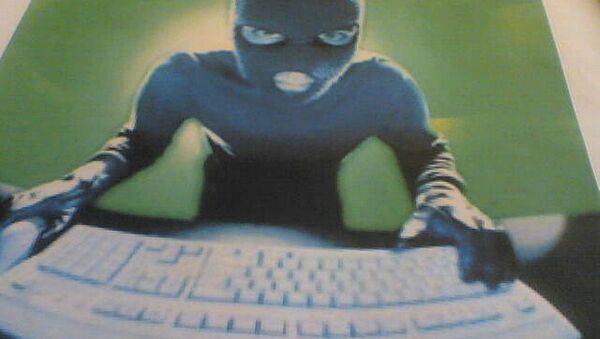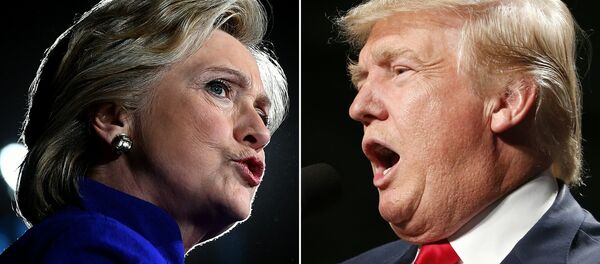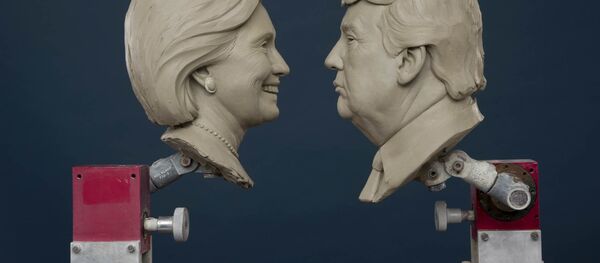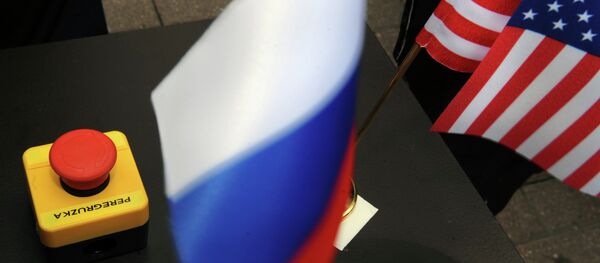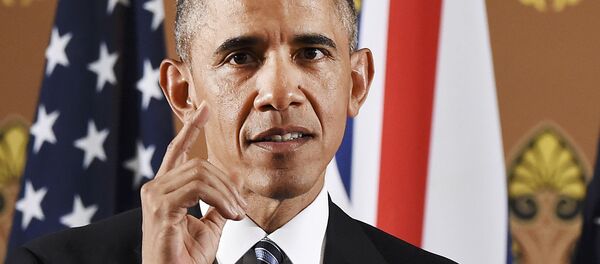WASHINGTON (Sputnik) — US political leaders were quick to blame Russia for cyber intrusions earlier this year, fueling fears the entire election system was vulnerable and would be targeted on November 8. Yet cyber experts and US authorities have indicated that the threat of an attack on election day was minuscule.
RUSSIAN SCAPEGOAT
In October, the Office of the Director of National Intelligence and the Department of Homeland Security (DHS) claimed they were confident the Russian government helped direct these and other compromises. And recent news reports show paranoia of a digital assault on election day has reached a new apex.
Last week, US government officials told NBC News Russian hackers might try to disrupt the election and Washington was "mounting an unprecedented effort to counter their cyber meddling."
"Officials are alert for any attempts to create Election Day chaos, and say steps are being taken to prepare for worst-case scenarios, including a cyber-attack that shuts down part of the power grid or the internet," the report stated.
US intelligence officials have warned that Moscow might also continue meddling after the election to "sow doubts about the legitimacy of the result," the Washington Post claimed in a story published on November 4.
Some lawmakers, however, argue that Washington has failed to present sufficient evidence to support allegations that Russia has materially interfered in the US election process.
"At this point I don’t think the case has been proven that Russia is involved in a big way in manipulating our [US] elections through hacking," US Congressman Dana Rohrabacher told Sputnik last week.
Moscow, for its part, has adamantly denied the allegations, including President Vladimir Putin who said US concerns about Russian involvement in the presidential elections amounted to hysteria.
"Does anyone seriously think that Russia can somehow influence the choice of the American people?" Putin asked rhetorically last month at the Valdai Discussion Club in Sochi. "Is America a banana republic or what? America is a great power."
Putin added that both candidates should concentrate on the important domestic issues during the elections instead of inventing stories about a Russian threat.
"It is much easier to distract people with the Russian so-called hackers, spies, [and] agents of influence," the Russian president maintained.
CYBER VULNERABILITIES
New Jersey Institute of Technology (NJIT) computer science professor Reza Curtmola said he was not too concerned hackers would be able to compromise election systems and influence the outcome of the voting.
"This is simply not possible because the large majority of the voting systems are not connected to the internet," Curtmola said in an article on NJIT’s website.
Curtmola added that DHS’s recommendation to classify voting systems as part of the nation’s critical infrastructure is a "step in the right direction."
Another step in the right direction, Curtmola said, is to implement hybrid systems with electronic touch-screen terminals that print voter-verified paper trails for auditing purposes. Paper ballots could then be counted manually and scanned for automated tallies.
"Security still remains an afterthought when new technologies are implemented, instead of being considered in the original design," Curtmola explained.
HOMELAND SECURITY EFFORTS
The US government in an effort to protect election systems hired more than 120 cybersecurity professionals since July, DHS Secretary Jeh Johnson said in a press release last month. The move came after the US Office of Personnel Management gave the DHS authority to hire 1,000 cybersecurity specialists.
In September, the DHS chief said his department was prepared to provide services to protect local and national election systems from cyber intrusions. Johnson told Congress 18 states had taken DHS up on the offer – a number that rose to 19 shortly after his testimony.
DHS offers system scams and vulnerability assessments as well as integration into the US national incident response center, Johnson noted.
Other federal officials said that while preparing to defend against cyber attacks was prudent, the likelihood of them actually happening was small.
Former US Assistant Attorney General John Carlin told Sputnik on the sidelines of a panel discussion at the Aspen Institute last month that the results of the US 2016 presidential election will not be affected by cyberattacks despite claims they might interfere in the country’s democratic process.
"It is extraordinary unlikely that the recent cyberattacks could affect the outcome of the [US] elections," Carlin said. "This is more an attempt to undermine people’s confidence than there is a realistic prospect of actually affecting the outcome."
IMPACT ON CRITICAL ‘SWING’ STATES
Last month, Pennsylvania Secretary of State Pedro Cortes addressed claims that the US election is rigged and "swing" states like his are particularly vulnerable to voter fraud.
"Our voting systems are secure and historically we have seen very, very minimal improper activity, so little that it is statistically non-existent," Cortes said at a press conference in Harrisburg, Pennsylvania.
The people who oversee the state’s elections, Cortes added, take pride in ensuring the system is fair and accountable, "from our staff at the Department of State to county election workers to poll-workers in the more than 9,100 precincts across Pennsylvania."
Cortes also said that suggesting the public servants who oversee US elections might be corrupt is not only unfair, but is also offensive.
"I am proud of the hard work done by our state and county election officials to protect and promote the democratic process," he said at the conference.
Cortes further noted that the Pennsylvania voting systems have been examined and certified to US federal and state standards, and are also equipped with redundant memory that allows vote records to be encrypted and stored in at least one other location on the voting machine.

